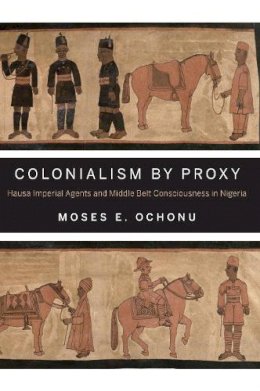
Stock image for illustration purposes only - book cover, edition or condition may vary.
Colonialism by Proxy: Hausa Imperial Agents and Middle Belt Consciousness in Nigeria
Moses E. Ochonu
€ 94.93
FREE Delivery in Ireland
Description for Colonialism by Proxy: Hausa Imperial Agents and Middle Belt Consciousness in Nigeria
Hardback. Explores a rare system of colonialism in Middle Belt Nigeria, where the British outsourced the business of the empire to Hausa-Fulani subcolonials because they considered the area too uncivilized for Indirect Rule. Num Pages: 294 pages, 5 maps. BIC Classification: 1H; 1HFD; GTB; HBG; HBLL. Category: (P) Professional & Vocational. Dimension: 5817 x 3887 x 18. Weight in Grams: 562.
Moses E. Ochonu explores a rare system of colonialism in Middle Belt Nigeria, where the British outsourced the business of the empire to Hausa-Fulani subcolonials because they considered the area too uncivilized for Indirect Rule. Ochonu reveals that the outsiders ruled with an iron fist and imagined themselves as bearers of Muslim civilization rather than carriers of the white man's burden. Stressing that this type of Indirect Rule violated its primary rationale, Colonialism by Proxy traces contemporary violent struggles to the legacy of the dynamics of power and the charged atmosphere of religious difference.
Product Details
Format
Hardback
Publication date
2014
Publisher
Indiana University Press
Condition
New
Number of Pages
272
Place of Publication
Bloomington, IN, United States
ISBN
9780253011602
SKU
V9780253011602
Shipping Time
Usually ships in 7 to 11 working days
Ref
99-50
About Moses E. Ochonu
Moses E. Ochonu is Associate Professor of African History at Vanderbilt University and author of Colonial Meltdown: Northern Nigeria in the Great Depression.
Reviews for Colonialism by Proxy: Hausa Imperial Agents and Middle Belt Consciousness in Nigeria
Ochonu's well-researched study makes good use of a variety of archival and oral sources. It is concisely written and case studies from across the Middle Belt effectively demonstrate how converging local experiences made for a broader regional consciousness.
Ufahamu
Ochonu's work is grounded and searching in its sensitivity to both political power and histories used to support it. His pioneering and invaluable contribution should inspire scholars to no longer ignore non-Muslim Northern Nigerians as political actors.
Journal of African History
Colonialism by Proxy represents a well-researched and significant intervention in the political history of Nigeria, and more broadly in analyses of the functioning and legacy of colonial rule in sub-Saharan Africa. By placing Hausa proxies at the center of his analysis and highlighting the inherent volatility and incompleteness of the British colonial project in Nigeria, Ochonu offers an important corrective to analyses that overdetermine the ability of colonial administrators to affect change.
Journal of West African History
The standard narrative of European colonial governance in Africa posits that indirect rule became the de facto model of colonial administration and that northern Nigeria was the quintessential example of indirect rule in action. Historian Ochonu . . . challenges this truism by examining 'subcolonialism' in the Middle Belt of northern Nigeria. . . . Recommended.
Choice
Colonialism by Proxy is a truly impressive volume. Analytically sophisticated in its conceptualization and profound in its engagement of Nigeria's complicated power configurations, Ochonu has written an authoritative book on a subject of great importance in Nigerian history.
American Historical Review
Ufahamu
Ochonu's work is grounded and searching in its sensitivity to both political power and histories used to support it. His pioneering and invaluable contribution should inspire scholars to no longer ignore non-Muslim Northern Nigerians as political actors.
Journal of African History
Colonialism by Proxy represents a well-researched and significant intervention in the political history of Nigeria, and more broadly in analyses of the functioning and legacy of colonial rule in sub-Saharan Africa. By placing Hausa proxies at the center of his analysis and highlighting the inherent volatility and incompleteness of the British colonial project in Nigeria, Ochonu offers an important corrective to analyses that overdetermine the ability of colonial administrators to affect change.
Journal of West African History
The standard narrative of European colonial governance in Africa posits that indirect rule became the de facto model of colonial administration and that northern Nigeria was the quintessential example of indirect rule in action. Historian Ochonu . . . challenges this truism by examining 'subcolonialism' in the Middle Belt of northern Nigeria. . . . Recommended.
Choice
Colonialism by Proxy is a truly impressive volume. Analytically sophisticated in its conceptualization and profound in its engagement of Nigeria's complicated power configurations, Ochonu has written an authoritative book on a subject of great importance in Nigerian history.
American Historical Review
